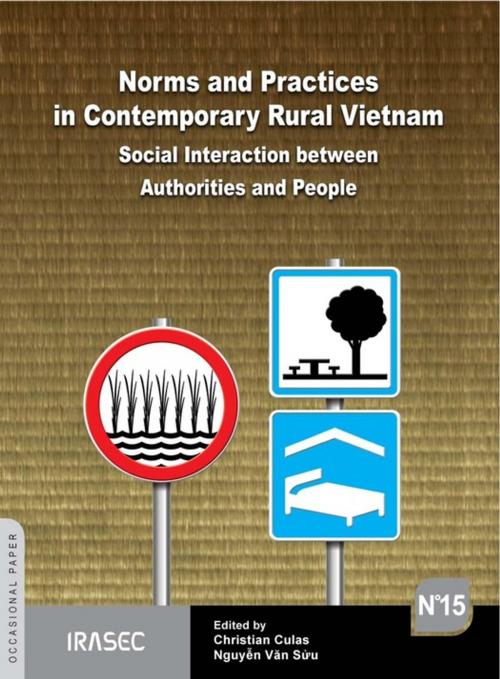Norms and Practices in Contemporary Rural Vietnam
Social Interactions between Authorities and People
Nonfiction, Social & Cultural Studies, Political Science, International| Author: | Collectif | ISBN: | 9782355960031 |
| Publisher: | Institut de recherche sur l’Asie du Sud-Est contemporaine | Publication: | August 16, 2018 |
| Imprint: | Institut de recherche sur l’Asie du Sud-Est contemporaine | Language: | English |
| Author: | Collectif |
| ISBN: | 9782355960031 |
| Publisher: | Institut de recherche sur l’Asie du Sud-Est contemporaine |
| Publication: | August 16, 2018 |
| Imprint: | Institut de recherche sur l’Asie du Sud-Est contemporaine |
| Language: | English |
Since the 1980s, while trying to maintain political stability and territorial integrity, the Vietnamese state has strongly moved towards the transformation of a centrally-planned economy to a more market-oriented model, in which private, foreign and joint-venture businesses are increasingly becoming the key pillars of the national economy. Another key aspect of the Đổi Mới's agenda was a fundamental shift in the party-state's foreign relations policy toward a normalization of Vietnam's diplomatic and trading relations with China, the United States, and other countries since the early 1990s. Over twenty years after the Đổi Mới renewal renovation, Vietnam has been praised by various domestic and international institutions for its “impressive” achievements in socio-economic development and poverty reduction and for its gradual liberalization and market diversification, coupled with its commitment to equality. Consequently, this has changed the relationship between the party-state and society in a number of fields, including the control of agricultural land and other forms of natural resources. Such transition marks a great change in our scholarly understanding of Vietnam. It has opened the door for intellectual exchange between academics and has resulted in a great amount of research and new knowledge/publications in different languages about various domains regarding Vietnamese society, including the relationships between the state and society at different levels and in various sectors or geographic areas. Among them, studies like those of Kerkvliet, Fforde and others, have developed the “everyday politics approach”, which examines social interactions on an everyday action basis. This approach “from below” has given a fresh impetus to the study of social relations in Vietnam. However, our observations regarding academic research show that besides a number of rich ethnographic studies, there are many analyses from different social science disciplines that give a generalized view of trends of development and change in Vietnamese society over the past decades with limited field data. This means that research projects based on first-hand data from longer periods of fieldwork and qualitative investigations are still inadequate. As a result, we are suggesting that more field-based research be carried out in order to enhance and promote our understanding of Vietnam, especially its processes of socio-political changes.
Since the 1980s, while trying to maintain political stability and territorial integrity, the Vietnamese state has strongly moved towards the transformation of a centrally-planned economy to a more market-oriented model, in which private, foreign and joint-venture businesses are increasingly becoming the key pillars of the national economy. Another key aspect of the Đổi Mới's agenda was a fundamental shift in the party-state's foreign relations policy toward a normalization of Vietnam's diplomatic and trading relations with China, the United States, and other countries since the early 1990s. Over twenty years after the Đổi Mới renewal renovation, Vietnam has been praised by various domestic and international institutions for its “impressive” achievements in socio-economic development and poverty reduction and for its gradual liberalization and market diversification, coupled with its commitment to equality. Consequently, this has changed the relationship between the party-state and society in a number of fields, including the control of agricultural land and other forms of natural resources. Such transition marks a great change in our scholarly understanding of Vietnam. It has opened the door for intellectual exchange between academics and has resulted in a great amount of research and new knowledge/publications in different languages about various domains regarding Vietnamese society, including the relationships between the state and society at different levels and in various sectors or geographic areas. Among them, studies like those of Kerkvliet, Fforde and others, have developed the “everyday politics approach”, which examines social interactions on an everyday action basis. This approach “from below” has given a fresh impetus to the study of social relations in Vietnam. However, our observations regarding academic research show that besides a number of rich ethnographic studies, there are many analyses from different social science disciplines that give a generalized view of trends of development and change in Vietnamese society over the past decades with limited field data. This means that research projects based on first-hand data from longer periods of fieldwork and qualitative investigations are still inadequate. As a result, we are suggesting that more field-based research be carried out in order to enhance and promote our understanding of Vietnam, especially its processes of socio-political changes.















